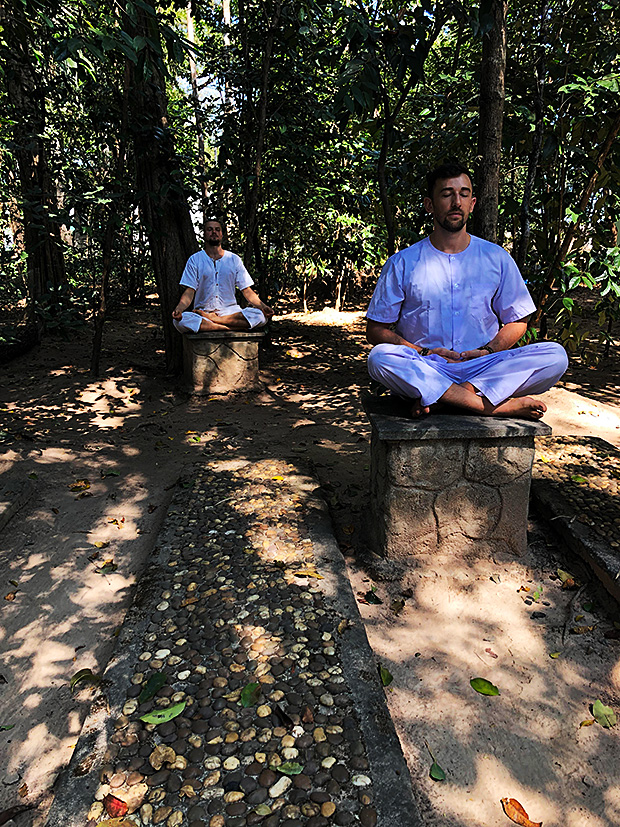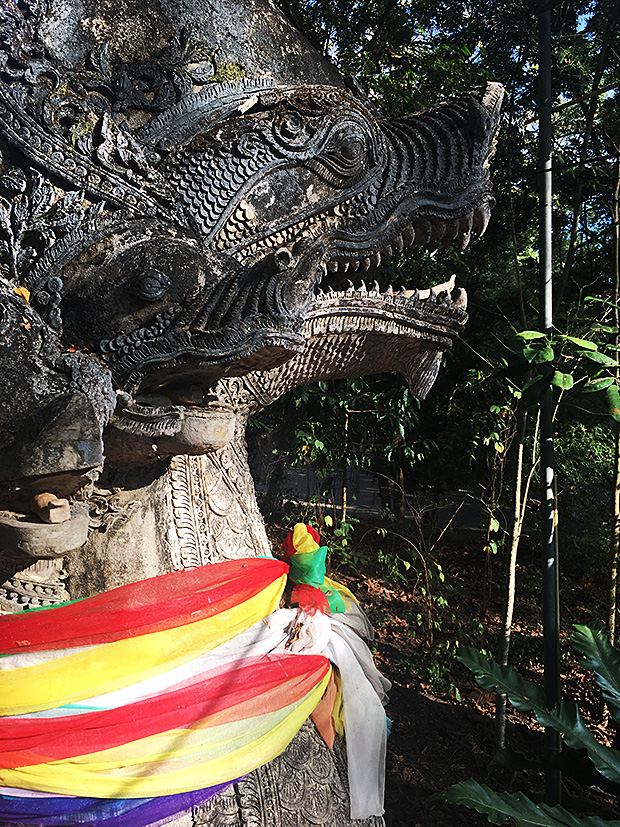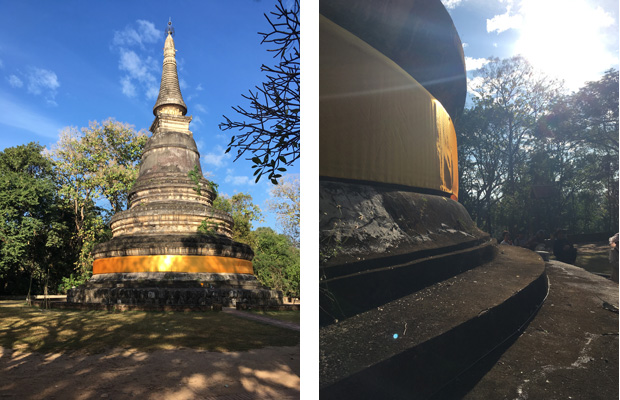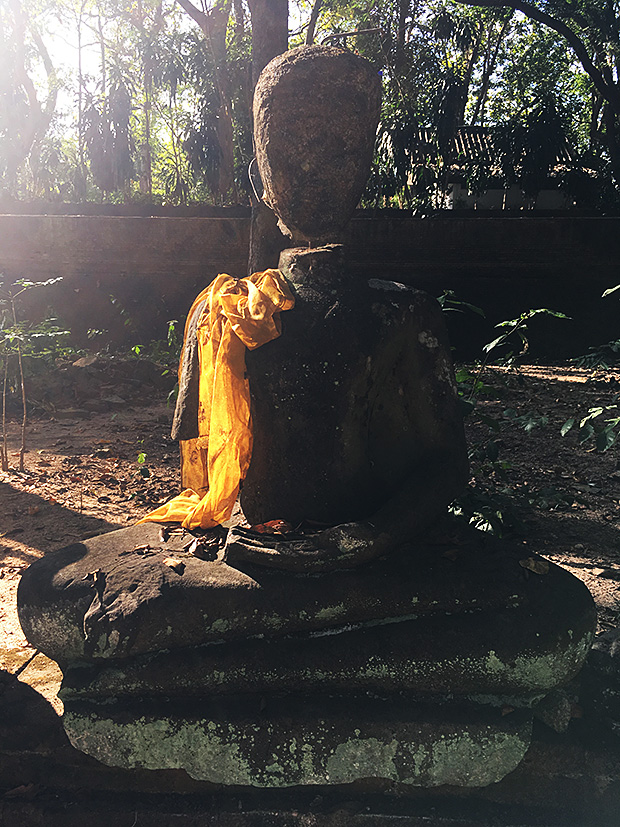This isn't working. My back hurts. This is a waste of time. I could've had a week in Paris. My back hurts.

Wat Umong meditation. (Photos by Christian Fottner)
Welcome to day three of a 10-day meditation retreat. Pain is your constant companion, along with an unending procession of random and sometimes negative thoughts. If the mind is an old coffee mug, meditation is the spoon that stirs up the bitter grounds from the bottom.
Doing basically nothing for a week-and-a-half is harder than you'd expect, so why are we here? Many attendees are seeking spiritual development or a mental detox, some are deeply Buddhist, some are there to make deposits in their merit account, and others want a crash course in getting mindful that will make a cool blog post. Most foreigners approach an extended stay at Chiang Mai's Wat Umong with excitement, curiosity and trepidation.
Wat Umong, built in the 13th century, is a ramshackle expanse of tall trees and ancient Buddha images. It lacks the constant crowds and gilded glitz of the more popular temples, and boasts the unique feature of a large mound laced with tunnels in which one can coolly wander, pausing in front of the several shrines. More tranquil is the forest next to the temple, home to wild deer, banteng cattle and the ruins of 16th-century Wat Phra Non.
At the temple's meditation centre, attendees are expected to follow the eight precepts -- the five basics with some extra no-nos thrown in -- and the spartan accommodation nails the "No luxurious beds or seats" rule. A 4.30am bell signals the first 90-minute meditation session before breakfast. While the monks eat whatever alms they've collected that day, meditators have a cook who seldom loses sight of the reflection that food is merely fuel for the body, rather than something that gives pleasure. More meditation precedes the 11am lunch, then there's meditation followed by yet more meditation -- more than six hours per day -- until a 9pm bedtime. The Wat Umong retreat isn't as strict as the neighbouring Wat Ram Poeng or Suan Mokhh in the South. While silence is requested, there's often subdued chatting between attendees, and the weekends see an influx of local meditators keen to make merit by simply being at the temple, untroubled by thoughts of respecting any restrictions on mobile-phone use.

A naga guards the chedi steps.
In terms of instruction, there's neither a lot to say nor a lot to understand. After chanting a couple of Buddhist prayers, our teacher, Phra Tawachai, guides us into meditation. Legs crossed, back straight, eyes closed, focus on the breath in and out and, well, that's it. This is anapanasati -- mindfulness through breath awareness. One simply focuses on the breath entering and leaving the body and waits for the mind to quieten. What could be easier?
Breathe in, breathe out. My back hurts. I hope there's curry for lunch. Remember that croissant in Paris? Breathe in, breathe out. Last Christmas I gave you my heart, but the very next day … my back hurts. I wish that dog would stop barking. Did someone just fart?
The monkey mind, Phra Tawachai says, can be a real pest. The more you try to ignore its random thoughts, the less likely you are to become calm. And over six hours a day for a handful of days, this can be extremely frustrating. You wait for your mind to run out of things to say, like on a bad date. You struggle with why your meditation is unsuccessful, as others speak of Zen moments and even manifestations of mesmerising light. Of course, meditating with a goal or target in mind is desire, one of the "defilements" we are seeking to eradicate. Phra Tawachai's advice is to just observe the thoughts, then return to the breathing. The provided books by monks such as Ajarn Chah and Buddhadasa Bhikkhu offer no further advice, so you get stuck rereading the first chapters for hidden clues or techniques.

The Lanna-style chedi of Wat Umong.
After five days, the mental chatter can become unbearable. Despair sets in -- if I can't get calm here, I can't get calm anywhere. My back hurts. I should have gone to Paris.
Taking whispered counsel from other attendees, I learn that we're all facing similar challenges. Christian, a German engineer staying at the temple for six weeks, suggests abandoning the quest for calm and just enjoying the beautiful forest, far from the stresses of daily life. It works.
It happens like this. On the sixth day, sitting cross-legged against a tree in the atmospheric ruins of Wat Phra Non, you notice you've become fascinated by your breath, following its course through the body. Observing the chest rising and the abdomen expanding, you slowly become aware that the mind has ceased its incessant chatter. You sink into a state of deep joyful calm, observing but not reacting to the sounds of the forest. After about 20 minutes, you slowly open your eyes and take a few moments to recalibrate.
This first stage of anapanasati, the sensation of absorption into the breath, is addictive. It's an almost narcotic peacefulness, like lucid sleeping while fully awake. But of course, chasing this feeling in your next session brings desire back into the meditative process, making the peace elusive once more. Over the next few days I experience deep calm two more times, but it's by no means guaranteed. Focusing on the breath seems to get easier, only to become impossible later the same day.
Day 10 is the most challenging because I'm back home. The birdsong and dappled sunlight of the forest are replaced by the hum of Bangkok traffic and the grit of city smog. For the retreat to have any lasting meaning, one must make meditation a part of daily life. The final talk by Phra Tawachai spoke of meditation as adding water to a leaking karmic bucket while our vices are eroding the metal. He spoke with a slight despondency, as if he was selling the world's greatest sports car and we were only interested in a quick test drive. But even after a brief spin, the benefits of regular meditation are clear. Increased mindfulness allows us more control over feelings like desire and anger. But as the fourth taxi driver refuses to take you home, the peace of the retreat seems a distant memory. So sit down, close your eyes and breathe in, breathe out.

Early morning sunlight at Wat Phra Non.

Many ancient Buddha images can be found on the temple grounds.
